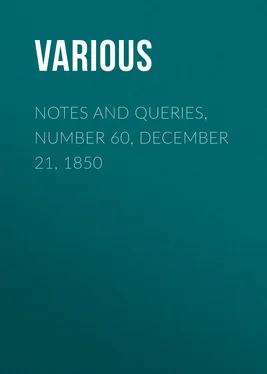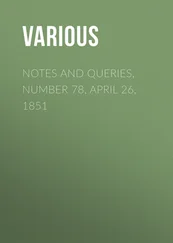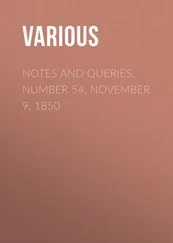Various - Notes and Queries, Number 60, December 21, 1850
Здесь есть возможность читать онлайн «Various - Notes and Queries, Number 60, December 21, 1850» — ознакомительный отрывок электронной книги совершенно бесплатно, а после прочтения отрывка купить полную версию. В некоторых случаях можно слушать аудио, скачать через торрент в формате fb2 и присутствует краткое содержание. Жанр: foreign_antique, periodic, foreign_edu, на английском языке. Описание произведения, (предисловие) а так же отзывы посетителей доступны на портале библиотеки ЛибКат.
- Название:Notes and Queries, Number 60, December 21, 1850
- Автор:
- Жанр:
- Год:неизвестен
- ISBN:нет данных
- Рейтинг книги:5 / 5. Голосов: 1
-
Избранное:Добавить в избранное
- Отзывы:
-
Ваша оценка:
- 100
- 1
- 2
- 3
- 4
- 5
Notes and Queries, Number 60, December 21, 1850: краткое содержание, описание и аннотация
Предлагаем к чтению аннотацию, описание, краткое содержание или предисловие (зависит от того, что написал сам автор книги «Notes and Queries, Number 60, December 21, 1850»). Если вы не нашли необходимую информацию о книге — напишите в комментариях, мы постараемся отыскать её.
Notes and Queries, Number 60, December 21, 1850 — читать онлайн ознакомительный отрывок
Ниже представлен текст книги, разбитый по страницам. Система сохранения места последней прочитанной страницы, позволяет с удобством читать онлайн бесплатно книгу «Notes and Queries, Number 60, December 21, 1850», без необходимости каждый раз заново искать на чём Вы остановились. Поставьте закладку, и сможете в любой момент перейти на страницу, на которой закончили чтение.
Интервал:
Закладка:
Various
Notes and Queries, Number 60, December 21, 1850 / A Medium of Inter-communication for Literary Men, Artists, Antiquaries, Genealogists, etc
Notes
DIVISION OF INTELLECTUAL LABOUR
Every one confesses, I believe, the correctness of the principle called "Division of labour." But if any one would form an adequate estimate of the ratio of the effect produced, in this way, to the labour which is expended, let him consult Dr. Adam Smith. I think he states, as an example, that a single labourer cannot make more than ten pins in a day; but if eight labourers are employed, and each of them performs one of the eight separate processes requisite to the formation of a pin, there will not merely be eight times the number of pins formed in a day, but nearly eighty times the number. (Not having the book by me, I cannot be certain of the exact statistics.)
If this principle is proved, then, to be of such extraordinary utility, why should it not be made serviceable in other matters besides the "beaver-like" propensity of amassing wealth and satisfying our material desires? Why should not your periodical be instrumental in transferring this invaluable principle to the labours of the intellectual world? If your correspondents were to send you abstracts or précis of the books which they read, would there not accrue a fourfold benefit? viz.:
1. A division of intellectual labour; so that the amount of knowledge available to each person is multiplied in an increasing ratio.
2. Knowledge is thus presented in so condensed a form as to be more easily comprehended at a glance; so that your readers can with greater facility construct or understand the theories deducible from the whole circle of human knowledge.
3. Authors and inquiring men could tell, before expending days on the perusal of large volumes, whether the particulars which these books contain would be suitable to the object they have in view.
4. The unfair criticisms which are made, and the erroneous notions diffused by interested reviewers, would in a great measure be corrected, in the minds, at least, of your readers.
You might object that such précis would be as partial as the reviews of which the whole literary world complain. But, in the first place, these abstracts would be written by literary men who are not dependent on booksellers for their livelihood, and would not therefore be likely to write up trashy books or detract from the merit of valuable works, for the sake of the book trade. And besides, your correspondents give their articles under their signature, so that one could be openly corrected by another who had read the same work. Again, it is only the leading idea of the book which you would require, and no attendant praise or blame, neither eulogistic exordium nor useless appeals to the reader. The author, moreover, might send you the skeleton of his own book, and you would of course give this the prior place in your journal.
Another objection is, that the length of such précis would not permit them to come within the limits of your work. But they should not be long. And even if one of them should take up four or five pages, you could divide it between two or three successive numbers of your periodical. And, besides, your work, by embracing this object, would be greatly increased in utility; the number of your subscribers would be multiplied, and the increased expense of publication would thus be defrayed.
But, if the advantages resulting from such a division of intellectual labour would be as great as I fondly hope, I feel sure that the energy and enterprise which caused you to give a tangible reality to your scheme for "Notes and Queries" would also enable you to overcome all difficulties, and answer all trifling objections.
R.M.ON A PASSAGE IN LOVE'S LABOUR'S LOST
In Love's Labour's Lost , Act II. Sc. 1., Boyet, speaking of the King of Navarre and addressing the Princess of France, says:
"All his behaviours did make their retire
To the court of his eye, peeping thorough desire:
His heart, like an agate, with your print impressed,
Proud with his form, in his eye pride expressed:
His tongue, all impatient to speak and not see ,
Did stumble with haste in his eyesight to be;
All senses to that sense did make their repair,
To feel only looking on fairest of fair."
This speech is a remarkable specimen of the affected style of compliment prevalent in the time of Elizabeth. The third couplet, at first sight, appears to have a signification exactly opposed to that which the context requires. We should expect, instead of "the tongue all impatient to speak ," to find "the tongue all impatient to see ."
No one of the editors of Shakspeare appears to me to have given a satisfactory explanation of this passage. I therefore venture to offer the following.
In the Latin poets (who in this followed the Greeks) we find adjectives and participles followed by the genitive case and the gerund in di . Thus in Horace we have "patiens pulveris atque solis," "patiens liminis aut aquæ cœlestis," and in Silius Italicus (vi. 612.), "vetus bellandi." For other instances, see Mr. Baines' Art of Latin Poetry , pp. 56-60.
The Latin poets having taken this license, then proceeded a step further, and substituted the infinitive mood for the gerund in di . I cannot find any instance either of "patiens" or "impatiens" used in this connection; but numerous instances of other adjectives and participles followed by the infinitive mood may be found in pp. 68. to 73. of the Art of Latin Poetry . I cite two only, both from Horace: "indocilis pauperiem pati," "quidlibet impotens sperare."
Following these analogies, I suggest that the words "impatient to speak and not see" mean "impatient of speaking (impatiens loquendi) and not seeing," i.e. , "dissatisfied with its function of speaking, preferring that of seeing."
This construction, at least, renders the passage intelligible.
X.Z.TREATISE OF EQUIVOCATION
I feel greatly indebted to J.B. for a complete solution of the question respecting this ambiguous book. Bewildered by the frequent reference to it by nearly cotemporaneous writers, I had apprehended it certain, that it had been a printed , if not a published work; and that even a second edition had altered the title of the first. It is now certain, that its existence was, and is, only in manuscript ; and that the alteration was intended only for its first impression, if printed at all. It is a fact not generally known, that many papal productions of the time were multiplied and circulated by copies in MS.: Leycester's Commonwealth , of which I have a very neat transcript, and of which many more are extant in different libraries, is one proof of the fact. 1 1 A Memorial for the Reformation in England , by R.P. (Parsons), of which I have a well transcribed copy, is another. It was published by Gee.
I observe that in Bernard's very valuable Bibliotheca MSS., &c. , I had marked under Laud Misc. MSS. , p. 62. No. 968. 45. A Treatise against Equivocation or Fraudulent Dissimulation , what I supposed might be the work in request: but being prepossessed with the notion that the work was in print, I did not pursue any inquiry in that direction. I almost now suspect that this is the very work which J.B. has brought to light. I had hoped during the present year to visit the Bodleian, and satisfy myself with an inspection of the important document. I am additionally gratified with the information relative to the same subject by Mr. Sansom, p. 446. J.B. observes, that the MS. occupies sixty-six pages only. Will no one have the charity for historic literature to make it a public benefit? If with notes, so much the better. It is of far more interest, as history is concerned, and that of our own country, than many of the tracts in the Harleian or Somers' Collections. Parsons's notice of it in his Mitigation , and towards the end, as if he was just then made acquainted with it, is very characteristic and instructive. He knew of it well enough, but thought others might not.
Интервал:
Закладка:
Похожие книги на «Notes and Queries, Number 60, December 21, 1850»
Представляем Вашему вниманию похожие книги на «Notes and Queries, Number 60, December 21, 1850» списком для выбора. Мы отобрали схожую по названию и смыслу литературу в надежде предоставить читателям больше вариантов отыскать новые, интересные, ещё непрочитанные произведения.
Обсуждение, отзывы о книге «Notes and Queries, Number 60, December 21, 1850» и просто собственные мнения читателей. Оставьте ваши комментарии, напишите, что Вы думаете о произведении, его смысле или главных героях. Укажите что конкретно понравилось, а что нет, и почему Вы так считаете.












